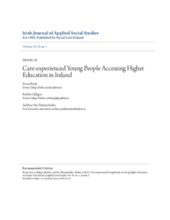

Displaying 871 - 880 of 1646
This paper reports on the initial formative phase of a pilot feasibility randomised controlled trial; SOLID (Supporting Looked After Children and Care Leavers In Decreasing Drugs, and Alcohol) that aimed to adapt two evidence-based psychosocial interventions, Motivational Enhancement Therapy and Social Behaviour and Network Therapy, which will aim to reduce substance misuse by looked after children.
This article examines the professional identities of family therapists employed by Family Counselling Services (FCS) in Norway and their experiences providing therapeutic services to parents whose children are placed in public care.
This brief paper focuses on the question of how care-experienced young people in Ireland fare in accessing opportunities in higher education.
This paper reports on innovative research methods using GPS [Global Positioning System] devices that can trace social workers' mobilities and explore the use of office space, home working and visits to families in two English social work departments. This article presents unique findings that reveal how mobile working is shaping social care practitioner wellbeing and practice.
The overall purpose of the study was to investigate how two different grading systems, the norm-referenced and the criterion-referenced garaging systems influence the educational achievement for children and youths placed in out-of-home care.
This paper sets out to give a rounded view of the Irish foster care system as currently constituted.
According to this report, children of prisoners in the UK are an "'invisible’ group – currently, children are not systematically identified or assessed when a parent goes to prison." The report aims to improve understanding of: who this ‘invisible’ group of children is; the extent, nature and root causes of their poorer outcomes; and how a whole family approach can be used to improve outcomes for children and parents and what needs to change.
In Wales, a significant body of work has been produced on and with care-experienced children and young people. This edited collection attempts to highlight these valuable insights in a single volume.
Communication skills are fundamental to social work, yet few studies have directly evaluated their impact. This study explores the relationship between skills and outcomes in 127 families.
This press release from the UK Department for Education announces the launch of new initiatives "to improve the education and training of young people leaving care, helping them make the transition into independent life."


